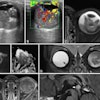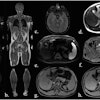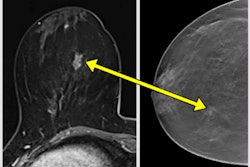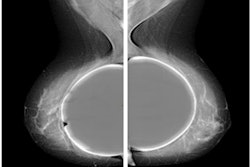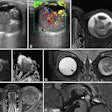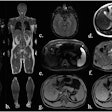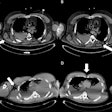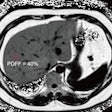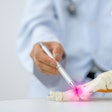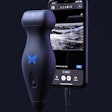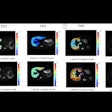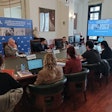MRI remains the gold standard for the diagnosis of breast implant rupture, but ultrasound can also be a useful screening tool in the initial assessment of implant integrity, U.K. researchers noted at the recent European Society of Breast Imaging (EUSOBI) annual meeting.
"Implant rupture is an important complication of breast augmentation performed for several reasons, including reconstruction post-mastectomy and cosmetic enhancement," radiology registrar Dr. Madiha Hussain and colleagues at University College Hospital noted in an e-poster.
"Implant rupture can be intracapsular or extracapsular, depending on the location of the ruptured silicone/saline in relation to the fibrous capsule," they explained.
Study logistics
The group evaluates the accuracy of ultrasound versus MRI in the diagnosis of breast implant rupture by conducting a retrospective analysis of patients who underwent an initial ultrasound scan followed by a breast implant MRI protocols exam between April 2019 and September 2022.
A total of 43 noncontrast MRI scans was performed for the assessment of breast implant integrity in suspected implant rupture with direct correlation to the findings on the prior breast ultrasound to determine the concordance rate and accuracy of ultrasound in diagnosing breast implant rupture.
Overall, 24 out of 34 cases (71%) demonstrated concordance between ultrasound and MRI in the assessment of breast implant rupture.
Of the 10 ultrasound scans with a definitive opinion, nine were concordant with findings about implant integrity on MRI. Of the 20 ultrasound scans that raised suspicion of implant rupture, 11 (55%) of these were concordant with implant rupture on MRI.
Of the four ultrasound scans reported as normal, all were concordant with no evidence of breast implant rupture on MRI; 38 out of 39 (97%) MRI breast implant exams demonstrated definitive findings, with only one indeterminate scan in which the patient did not undergo subsequent surgery, so the outcome remained unclear.
All patients with implant rupture on MRI had an abnormal ultrasound with either definitive findings or those raising suspicions for implant rupture. Furthermore, a completely normal ultrasound examination has a very high negative predictive value for implant integrity.
Factors that can affect the concordance between ultrasound and MRI include good clinical examination and level of suspicion, experience of the radiologist interpreting the images, the quality of the imaging equipment as well as the type of implant used.
Limitations of ultrasound
With ultrasound, much depends on the expertise of staff, and the best test is definitely MRI, according to Dr. Elisabetta Giannotti, consultant breast radiologist, Cambridge Breast Unit, Addenbrooke's Hospital NHS Foundation Trust, U.K.
"If an implant is ruptured, it is mainly a cosmetic issue and it is not dangerous," she told AuntMinnieEurope.com. "The patient's symptoms can be managed according to the clinical findings, but unless there are clinical indications, you don't want to send someone with an intact implant to surgery."
In the UCL study, there were 20 cases where ultrasound raised concern about implant ruptures, but only 11 were confirmed on MRI. This would risk sending patients to surgery when they don't have an implant rupture, she added.
"As the study demonstrates, ultrasound can be used as screening tool by expert operators to check for implant integrity. In case of doubt or suspicion of implant rupture, MRI should be performed," Giannotti said.
You can read the full EUSOBI e-poster here. The co-authors were Drs. Hussain Amin, Kate Hawtin, Sophie Pattison, Ayman Mahfouz, Hela Sbano, and Bahareh Gholipour.
